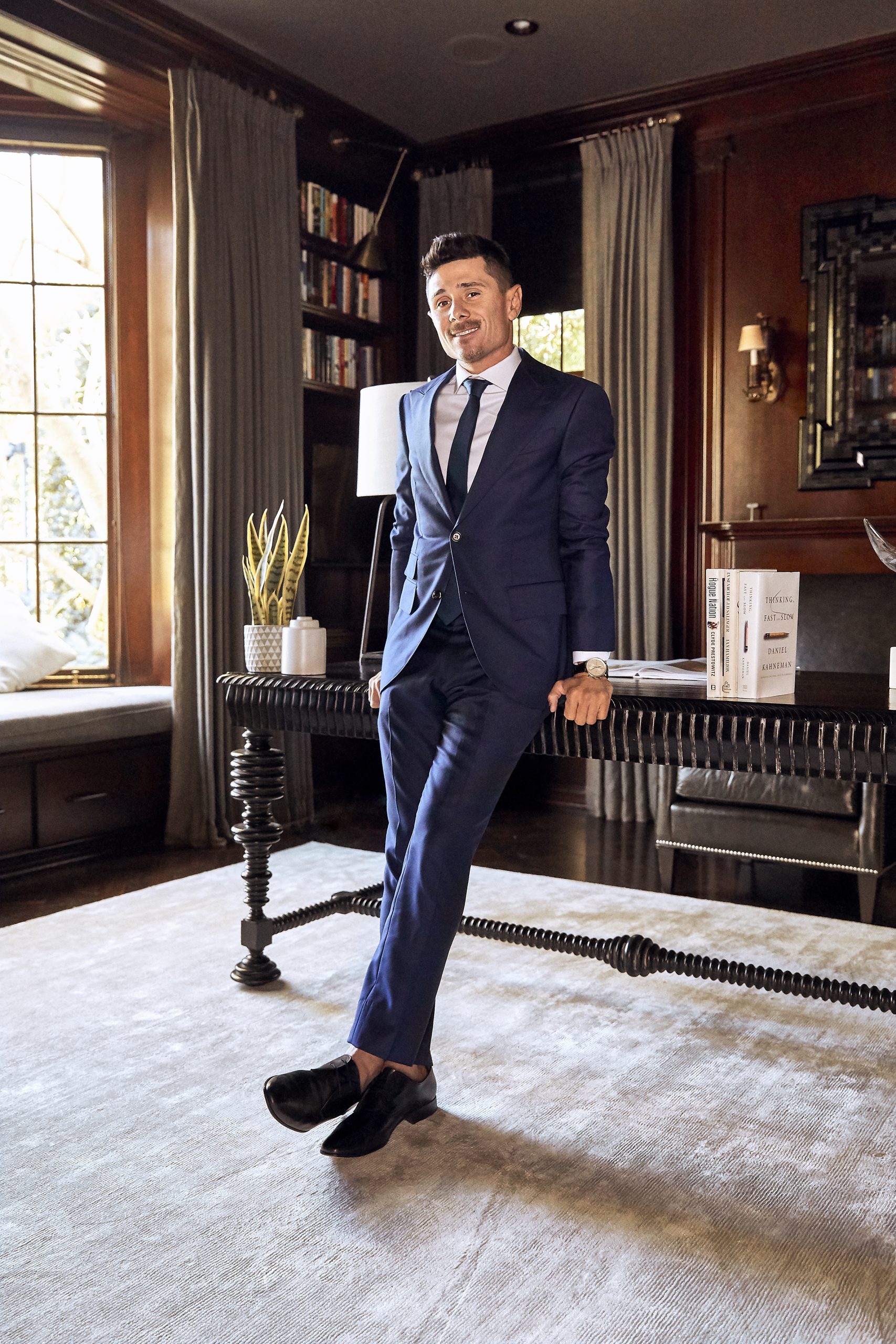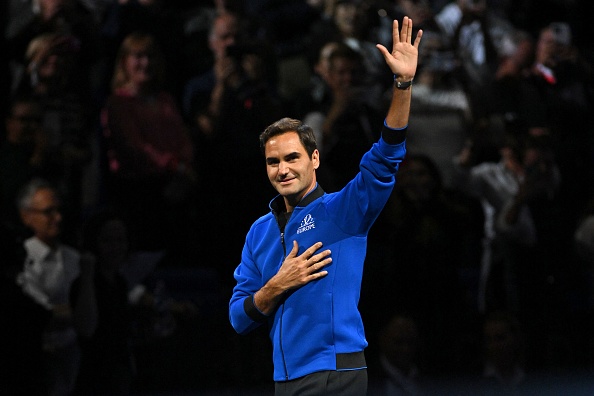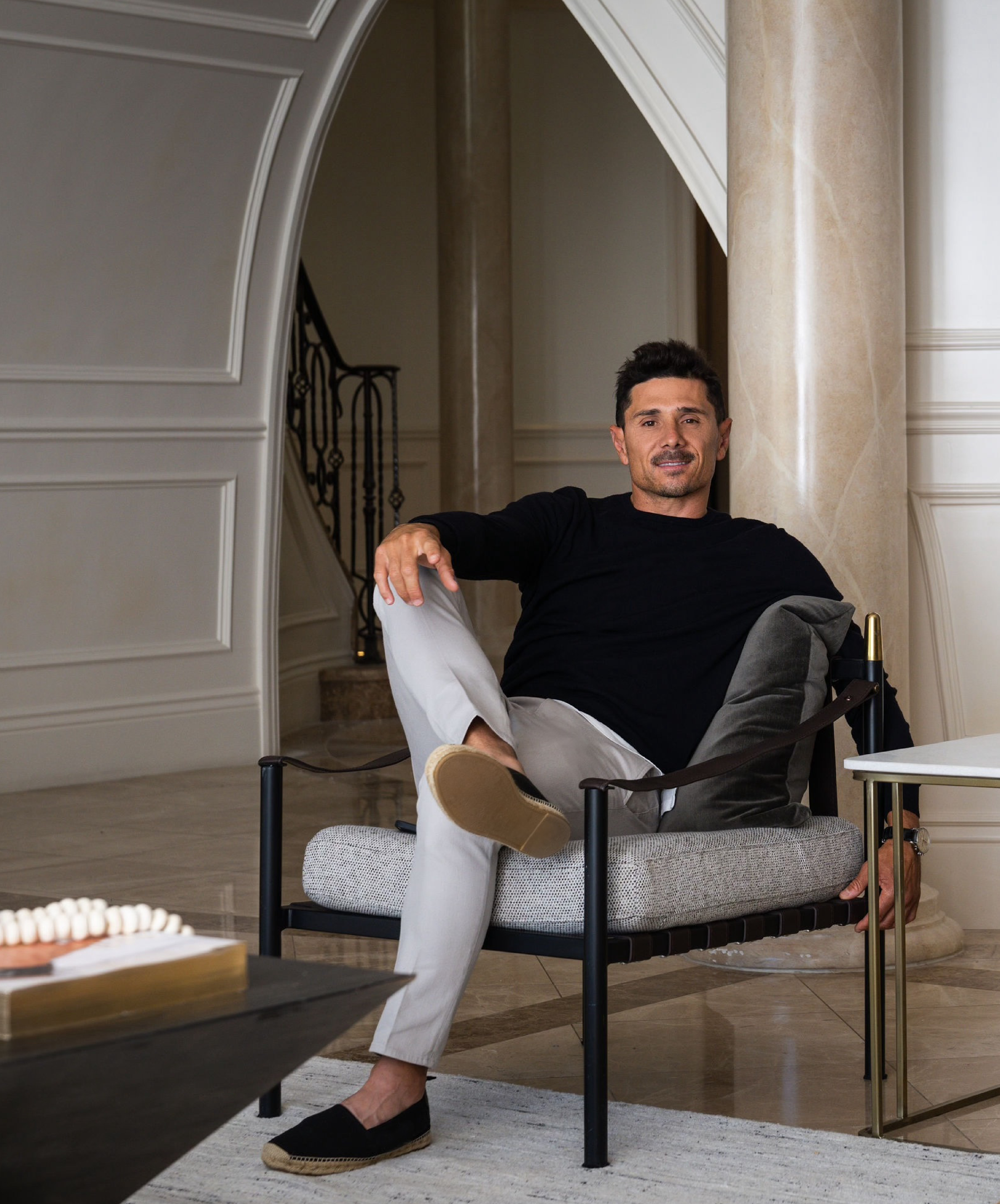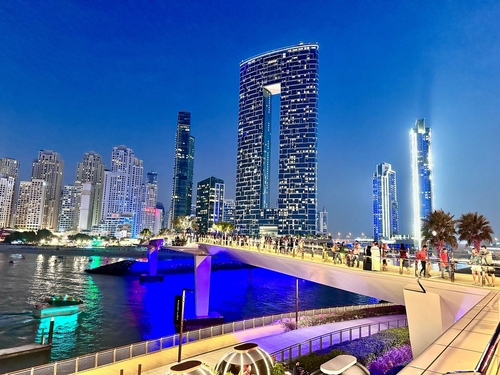How Bjorn Farrugia swapped the tennis racket for acing the LA real estate market
When a career on the international tennis circuit stalled, this one-time Melbourne local took on one of the toughest real estate markets in the world, and won.
Bjorn Farrugia admits he had nothing but drive when he left Australian shores in the early 2000s to pursue his dream to be the next Roger Federer. Named for Swedish tennis star Bjorn Borg, at the age of 21, Farrugia had never been on a plane before making his way to the US state of Georgia on a scholarship. When his tennis career stalled, he pivoted, seeking his fortune in New York and eventually finding his place in the luxury real estate market of Los Angeles. How he managed to climb one of the most competitive markets in the world is a story of determination and hard work for the Melbourne boy made good.
He spoke with Kanebridge News not long after the passing in March of his friend and business associate, Melbourne property developer Jonathan Hallinan. Here he reflects on what it takes to be successful in business without compromising your integrity, and the joy of being able to buy your mum a house.
How long since you’ve been in Australia?
Despite having lived in the US for two decades, I make an effort to return to Australia at least once a year. During my most recent trip in December 2022, I had the chance to visit one of my closest friends who was battling an illness. Although he has since passed away, I cherish the memories of the time we spent together. In addition to spending time with my friend, I also took the opportunity to explore Melbourne once again. It truly is one of the greatest cities in the world.
So you’re used to American coffee? That must be tough for a Melbourne boy.
Although I love coffee, I happen to be one of those people who are “naturally caffeinated.” As a result, I’ve learned to enjoy green or chamomile tea instead. I do compensate for this by maintaining an incredibly extensive collection of my favourite Australian chocolates in my home. A section of my kitchen has practically transformed into an Australian lolly shop.
How did you come to terms with not being a top tennis player?
At first, it was really difficult for me to accept that I wasn’t going to make it as a professional tennis player. I had invested a lot of time and effort into the sport, and I was disappointed that I wasn’t able to achieve the level of success that I had hoped for.
For a while, I was really down about it. I didn’t want to play tennis anymore, even though it was something that I loved to do. In time, I realised I could channel my competitive energy into something else that I was passionate about: my career in real estate.
I threw myself into my work, I found that I was still able to satisfy that same desire to compete, even though it wasn’t on the court. Over time, I started playing tennis again, just for fun. It wasn’t about being the best anymore – it was just about enjoying the game and spending time with friends. Tennis has been one of the greatest joys and has taught me so many life lessons that I am forever grateful for.
You’ve said that Roger Federer is your favourite player. What was it about his game that appealed to you?
I have always been drawn to Roger Federer’s game. There is something about the way he moves on the court that is simply mesmerising. His style of play is elegant and graceful, and his precision is unmatched. Watching him play is like watching a work of art in motion.
What really sets him apart, in my opinion, is his demeanour on and off the court. He is the epitome of sportsmanship and grace under pressure. He never loses his cool, even in the most intense moments of a match. And he always shows respect and kindness to his opponents, win or lose.
As someone who strives to be a good sport and a kind person, Roger has always been an inspiration to me. I admire his dedication to his craft, his humility, and his unwavering commitment to being the best he can be. He truly embodies what it means to be a champion, both on and off the court and that is something that I have learned to carry on in my life and in my career.
How did you get from being a promising tennis star who had to reassess life to a real estate king?
My journey from tennis to real estate wasn’t an easy one. When I was younger, I was on the trajectory to becoming a promising tennis star with dreams of becoming a professional player. Unfortunately, those dreams didn’t pan out. It was a difficult time in my life, and I had to reassess my goals and figure out what I wanted to do next.
In time, I discovered my passion for real estate. I found that I loved the challenge of negotiating deals, building relationships with clients, and finding creative solutions to problems. I started out small, but with hard work and dedication, I eventually built my real estate career and while I am definitely not a real estate king yet, I feel I am getting closer and closer to my ultimate goal every day.
Of course, there were challenges along the way. Real Estate is a tough industry, and it takes a lot of grit and determination to succeed. I never gave up, even when things got tough. I kept pushing forward, always looking for new opportunities and ways to grow my business.
Now I feel proud of what I’ve accomplished. I may not have become a tennis star, but I found my true calling in real estate. And I know that with my drive and determination, I can continue to achieve great things in the years to come.
What are those attributes?
In my opinion, to excel in working with people, I think it’s essential to possess the skill of connecting with them, managing diverse personalities, and upholding integrity and amiability. Many people have complimented me on these skills, and I find it easy to strike up a conversation and establish a connection with someone, which is a common trait among Aussies.
In any business venture, there are a few key things that you must excel at to be successful. Firstly, you need an unquenchable thirst for success and be relentless in your pursuit. Secondly, you must believe that you deserve to succeed and not let “no” deter you from reaching your goals. To achieve this, you must live, breathe, eat, and dream about your objectives. You need to be passionate and committed, and you must work hard every day to make your dreams a reality.
Sometimes, you may face rejection, but it’s crucial to remain undaunted and pick yourself up, even when someone tells you “no”. With a combination of hard work, perseverance, and a refusal to give up, you can achieve great success in any field you choose.

Has it been particularly difficult breaking through in LA?
After school, I decided to pursue a professional tennis career, but eventually transitioned to finance when I moved to New York City. Although it wasn’t a financially lucrative experience, it helped shape who I am today. I took a big leap of faith when I left my family in Australia and moved to the other side of the world, where I knew nobody and had never even been on a plane before. At the time, I was inexperienced and naive, but determined to succeed.
Living in New York City taught me that when you come from nothing and have nothing, you have to be proactive and work tirelessly to achieve your goals. Moving to Los Angeles presented a new set of challenges, but I knew that I had to work just as hard to succeed.
Throughout my journey, I have always maintained a big vision for my future. I am a very competitive person, but I only compete with myself. I don’t get caught up in what others are doing. My mentality is simple: always try your best and give it your all.
I have been fortunate enough to have an incredible support system around me. My fiancé has played a huge role in helping me build my business from the ground up. I also have a dedicated team and loyal clients, and a group of great friends who have always had my back – many of whom are from Australia.
One of your ambitions was to buy a house for your mum. How was that moment?
Since I was just a little boy, I always dreamed of buying my mum a house. I was able to make one of my dreams come true— I even went a step further and purchased the neighbouring home to give her two homes next to each other. The act of buying the home for my mum was amazing, but giving it to her was even more rewarding for me. Reflecting on where I came from, it was truly special to fly back home to help my mum move in. I didn’t even see the house before I bought it, but I knew it was in the perfect neighbourhood as it’s where I grew up. Handing over the keys to my mum and watching her move in was such a profound moment. It felt like I was the one receiving a gift instead of her. Coming from the background that I did, I am extremely proud and grateful for being able to make this happen for her and my family.
You’re in one of the most competitive real estate markets in the world. What still gets you out of bed in the morning?
For me, it’s about legacy and family. I wake up every morning driven by the desire to succeed and be the best version of myself. When I first started in this competitive real estate market, my goal was to accumulate vast wealth. I have a burning desire to win and always strive to come out on top. Losing is not an option for me, and I always have high expectations for myself. Sometimes those expectations may seem absurdly unrealistic, but that’s what sets me apart from the rest. I refuse to settle for mediocrity or conform to the norm. However, my best mate, Jonathan Hallinan, taught me that there’s more to life than just money. My ultimate goal is to live a fulfilling and happy life. Don’t get me wrong, I’m still incredibly hungry for success but spending time with my family and enjoying the special moments is way more important to me.
Are you looking at returning to Melbourne anytime soon?
I recently lost my best mate in Melbourne, so it may be a while before I return there. However, I have always imagined owning a holiday house somewhere like Sorrento or Rosebud. While I am starting to establish myself in America, I still hold a deep affection for Australia because it has shaped me into the person I am today.
What would you say to someone who is looking to enter real estate now, who has that kind of drive to succeed?
As someone who has experienced success in real estate, my advice to someone who is looking to enter the industry now and has the drive to succeed is to first work on a team. It’s important to work with people who are doing deals and producing results, so you can see firsthand what a successful agency looks like and get exposed to deal flows.
Next, find someone you trust and want to emulate, someone who has a good moral compass, and work with them. Read a lot of books on how to start in real estate. There’s one book in particular I highly recommend called The Millionaire Real Estate Agent by Gary Keller, Dave Jenks, and Jay Papasan. Gary Keller is the founder of Keller Williams Realty, and the principles he outlines in that book can be applied to any business.
When I first started in real estate, I called every major real estate agent and asked them to have coffee with me. I told them I wanted to learn from them and asked them how they became successful. I called one guy 17 times, but eventually, I met all of them except for three. By taking one thing from each person and incorporating it into my own approach, I was able to develop an incredible set of tools to help me succeed.
It’s important to remember that success in real estate takes time and effort, but if you stay focused, work hard, and learn from those who have come before you, there’s no limit to what you can achieve. Even though people might tell me I’m at the top, I believe I’m just getting warmed up and have so much more to learn and accomplish in this industry.
What’s important to you now?
Right now, the most important thing to me is my family and spending time with my fiancé and my three-year-old son. While money is certainly important, I value the freedom it can provide more than the material possessions it can buy.
Recently, I was up working at 6am and learned that Roger Federer was retiring; four days later, I was in London to witness his last match (in September 2022). I just had to be there to see this special moment. I was lucky that my hard work gave me the freedom and opportunity to see Roger play in his last tournament. At the same time, I recognise that having the freedom to take my son to the park on a Tuesday afternoon is just as important. I enjoy being able to balance my career aspirations and my family – and of course have the time to work on my tennis swing.

What’s your message for people who want to achieve what you have?
My message to those who aspire to achieve what I have is to never give up on your dreams, no matter how difficult the journey may seem. It takes a lot of hard work, dedication, and perseverance to make your dreams a reality. Don’t be afraid to take risks and step out of your comfort zone. Surround yourself with supportive people who believe in you and your goals. And most importantly, always remember why you started and let that drive you forward. With enough passion, determination, and a willingness to learn and grow, you can achieve anything you set your mind to.
This stylish family home combines a classic palette and finishes with a flexible floorplan
Just 55 minutes from Sydney, make this your creative getaway located in the majestic Hawkesbury region.
As Paris makes its final preparations for the Olympic games, its residents are busy with their own—packing their suitcases, confirming their reservations, and getting out of town.
Worried about the hordes of crowds and overall chaos the Olympics could bring, Parisians are fleeing the city in droves and inundating resort cities around the country. Hotels and holiday rentals in some of France’s most popular vacation destinations—from the French Riviera in the south to the beaches of Normandy in the north—say they are expecting massive crowds this year in advance of the Olympics. The games will run from July 26-Aug. 1.
“It’s already a major holiday season for us, and beyond that, we have the Olympics,” says Stéphane Personeni, general manager of the Lily of the Valley hotel in Saint Tropez. “People began booking early this year.”
Personeni’s hotel typically has no issues filling its rooms each summer—by May of each year, the luxury hotel typically finds itself completely booked out for the months of July and August. But this year, the 53-room hotel began filling up for summer reservations in February.
“We told our regular guests that everything—hotels, apartments, villas—are going to be hard to find this summer,” Personeni says. His neighbours around Saint Tropez say they’re similarly booked up.
As of March, the online marketplace Gens de Confiance (“Trusted People”), saw a 50% increase in reservations from Parisians seeking vacation rentals outside the capital during the Olympics.
Already, August is a popular vacation time for the French. With a minimum of five weeks of vacation mandated by law, many decide to take the entire month off, renting out villas in beachside destinations for longer periods.
But beyond the typical August travel, the Olympics are having a real impact, says Bertille Marchal, a spokesperson for Gens de Confiance.
“We’ve seen nearly three times more reservations for the dates of the Olympics than the following two weeks,” Marchal says. “The increase is definitely linked to the Olympic Games.”

Getty Images
According to the site, the most sought-out vacation destinations are Morbihan and Loire-Atlantique, a seaside region in the northwest; le Var, a coastal area within the southeast of France along the Côte d’Azur; and the island of Corsica in the Mediterranean.
Meanwhile, the Olympics haven’t necessarily been a boon to foreign tourism in the country. Many tourists who might have otherwise come to France are avoiding it this year in favour of other European capitals. In Paris, demand for stays at high-end hotels has collapsed, with bookings down 50% in July compared to last year, according to UMIH Prestige, which represents hotels charging at least €800 ($865) a night for rooms.
Earlier this year, high-end restaurants and concierges said the Olympics might even be an opportunity to score a hard-get-seat at the city’s fine dining.
In the Occitanie region in southwest France, the overall number of reservations this summer hasn’t changed much from last year, says Vincent Gare, president of the regional tourism committee there.
“But looking further at the numbers, we do see an increase in the clientele coming from the Paris region,” Gare told Le Figaro, noting that the increase in reservations has fallen directly on the dates of the Olympic games.
Michel Barré, a retiree living in Paris’s Le Marais neighbourhood, is one of those opting for the beach rather than the opening ceremony. In January, he booked a stay in Normandy for two weeks.
“Even though it’s a major European capital, Paris is still a small city—it’s a massive effort to host all of these events,” Barré says. “The Olympics are going to be a mess.”
More than anything, he just wants some calm after an event-filled summer in Paris, which just before the Olympics experienced the drama of a snap election called by Macron.
“It’s been a hectic summer here,” he says.

AFP via Getty Images
Parisians—Barré included—feel that the city, by over-catering to its tourists, is driving out many residents.
Parts of the Seine—usually one of the most popular summertime hangout spots —have been closed off for weeks as the city installs bleachers and Olympics signage. In certain neighbourhoods, residents will need to scan a QR code with police to access their own apartments. And from the Olympics to Sept. 8, Paris is nearly doubling the price of transit tickets from €2.15 to €4 per ride.
The city’s clear willingness to capitalise on its tourists has motivated some residents to do the same. In March, the number of active Airbnb listings in Paris reached an all-time high as hosts rushed to list their apartments. Listings grew 40% from the same time last year, according to the company.
With their regular clients taking off, Parisian restaurants and merchants are complaining that business is down.
“Are there any Parisians left in Paris?” Alaine Fontaine, president of the restaurant industry association, told the radio station Franceinfo on Sunday. “For the last three weeks, there haven’t been any here.”
Still, for all the talk of those leaving, there are plenty who have decided to stick around.
Jay Swanson, an American expat and YouTuber, can’t imagine leaving during the Olympics—he secured his tickets to see ping pong and volleyball last year. He’s also less concerned about the crowds and road closures than others, having just put together a series of videos explaining how to navigate Paris during the games.
“It’s been 100 years since the Games came to Paris; when else will we get a chance to host the world like this?” Swanson says. “So many Parisians are leaving and tourism is down, so not only will it be quiet but the only people left will be here for a party.”
This stylish family home combines a classic palette and finishes with a flexible floorplan
Just 55 minutes from Sydney, make this your creative getaway located in the majestic Hawkesbury region.


















